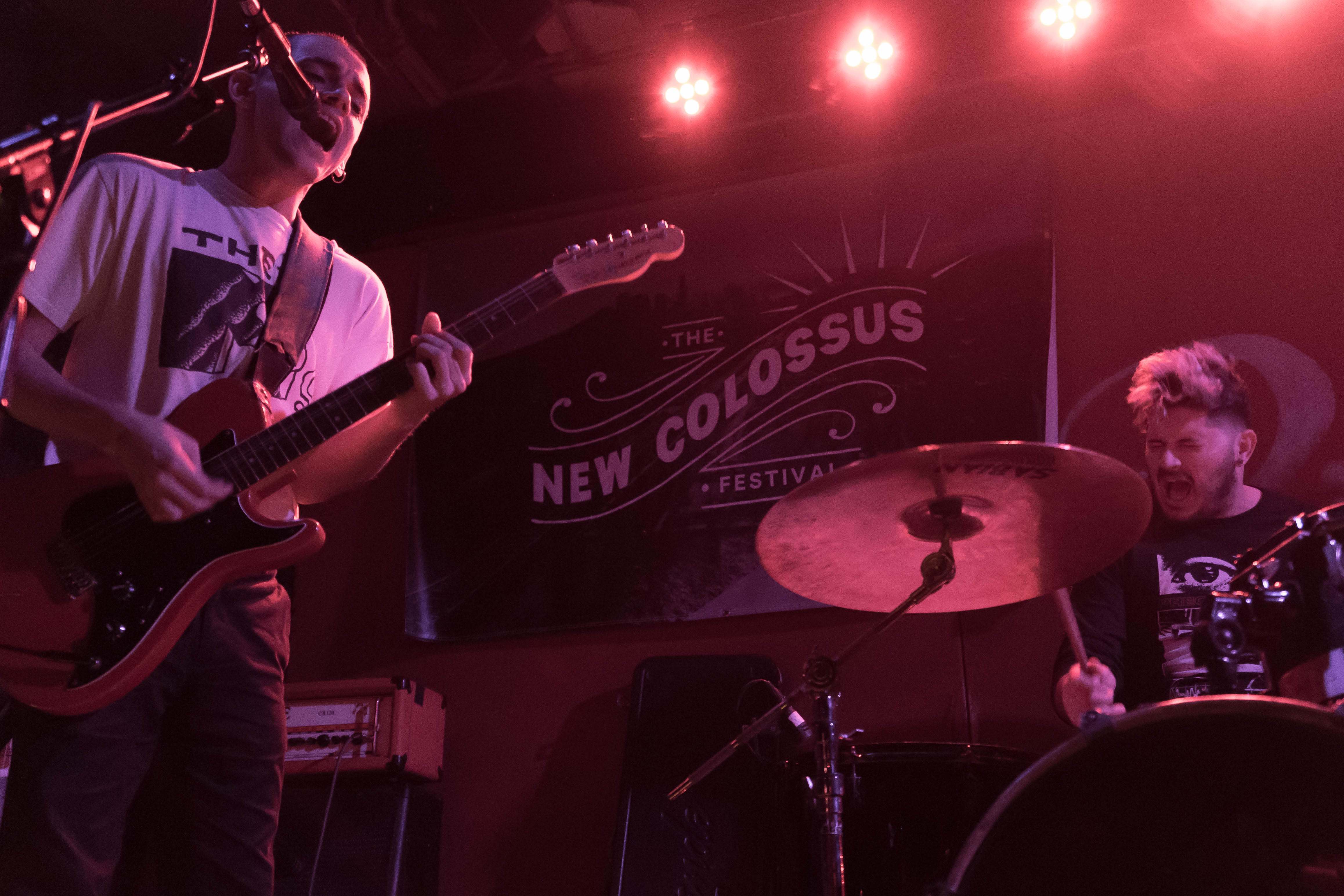While I don’t necessarily subscribe to the idea that the best measure of a band is watching them perform live, few things compare to a band you’ve never heard of catching you by surprise and blowing you away in-person. Sadly, that’s something that happens less and less often in this day and age, as big festivals seem to keep rotating the same headline acts year after year. CMJ—New York’s annual new band fiesta—is no more, and SXSW is now as much a playground for brands and corporations to compete with each other by securing the biggest names in the industry as it is a platform for cultivating and exposing new music. As websites rely more and more directly on clicks, they need to generate content—the dreaded word—that will definitely draw people in. This means, increasingly, that already-hyped or established acts get coverage.
The New Colossus Festival, held from March 7 to 10 this year, was designed as an antidote to all that. Taking place across six venues on New York’s Lower East Side—the birthplace of American punk, whose bars now mainly cater to a vapid, cultureless frat crowd—the festival not only brought back the excitement of live music, but also the sheer joy of discovering new music in an organic and immediate fashion. While there were some music industry–centered panels à la SXSW, with a weekend badge available to anybody for only $50, New Colossus was also a much-needed rebuttal of elitism. It’s a fest for people who really love music, especially those who look past the charts and enjoy discovering what exists beneath the surface of the mainstream. It offered international rising bands a nurturing and supportive platform where they wouldn’t be eclipsed by more famous acts.
“We wanted to make the festival as even a playing field as possible, and not have any venues empty because everyone is watching some headliner.” —Mike Bell, co-founder
“For us, it’s about making it accessible,” says Mike Bell, who founded the festival with Lio Kanine and Steven Matrick. “It’s about demolishing the layer that seems to have been created in the music industry where fans don’t have access to emerging bands in such a manner. That’s really a shame, because bands need those fans and they need to build an audience. Of course, they also need to be seen by the industry, but by the time they get to a giant festival like SXSW, it can be really hard. First and foremost, we just wanted to make sure these bands aren’t playing to empty rooms.”
They certainly weren’t. Every gig I was at was well-attended, with line-ups that complemented each other in style and genre. I’ve been that guy at festivals rushing off to see a band I love play for the tenth time—so it was both refreshing and exhilarating to realize that this time, I might just see a band I didn’t know I loved yet.
“We could have put some headliners into the mix to draw out more people,” Bell admits, “but we wanted to make this purely a discovery festival. These bands are not completely unknown, but we wanted to make the festival as even a playing field as possible, and not have any venues empty because everyone is watching some headliner.”
Over four days, doors to previously untapped worlds of music were thrown open to me. There was the captivating, melancholy post-punk-meets-shoegaze of Italy’s Be Forest, who fall somewhere between The Cure and Exitmusic, and whose performance was every bit as mesmerizing as their songs. There was the bratty but nuanced psychedelic punk of Spain’s Kings of the Beach, whose spritely, rambunctious set was so good the first time I saw it I had to break my own rule and see them again the next day. Wooing—fronted by Rachel Trachtenburg, of the now-defunct parent and daughter anti-folk oddities the Trachtenburg Family Slideshow Players—were full of vim and vigor, while the delicately haunting so-called slowcore of Norway’s The Other End sent shivers down my very unprepared spine. Elsewhere, Lev Snowe offered up some comforting and warming electro-pop vibes that stood in stark contrast to his native Winnipeg’s harsh, drawn-out winters, while fellow Canadians Walrus and Australia’s Body Type both kept my festival-tired mind awake with their insistent energy. There was also the slacker-rock of Spain’s Go Cactus, the unashamedly fun dance-pop of Radiant Baby, and the eccentric, campy odd-pop/punk of the UK’s Nancy.
I’ve been that guy at festivals rushing off to see a band I love play for the tenth time—so it was both refreshing and exhilarating to realize that this time, I might just see a band I didn’t know I loved yet.
The one downside was the previously mentioned obnoxious frat crowd, who infiltrated Fatherson’s late night show on Saturday and made it (sadly) impossible to actually hear the anthemic Scottish indie rockers. Still, as complaints go, that one was minor. It’s also worth pointing out that in a world where festival lineups are dominated by male-fronted bands, more than half of those at New Colossus were female-fronted.
“It’s about stripping away all the noise and bullshit,” says Bell matter-of-factly. “Music doesn’t need all that to exist and be enjoyed, and if you tear away those layers of branding and those non-musical elements, you can create something really beautiful. I think we’ve proven that that can be done and I’m super excited for the coming years to see how we can grow this into something amazing for the world.”
Here’s to next year, then. And hopefully the next, and the next, and the next. Right now, though, I’m going to listen to all those bands I fell in love with that weekend. First up: Kings of the Beach. Or maybe Be Forest. Or perhaps The Other End. Or maybe…you get the idea. FL









